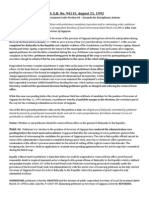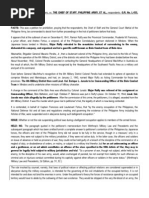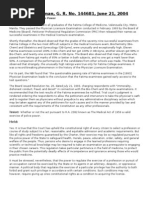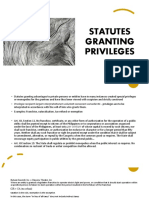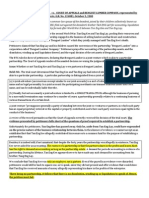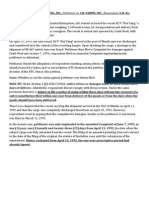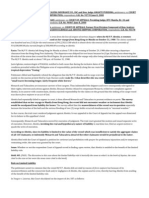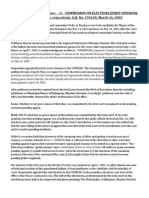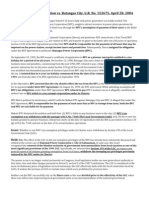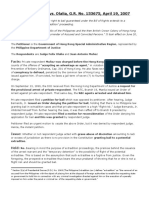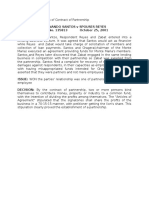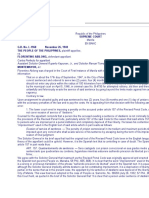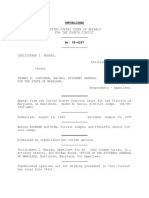Digest Oliva vs. Lamadrid
Digest Oliva vs. Lamadrid
Uploaded by
Paul Vincent CunananCopyright:
Available Formats
Digest Oliva vs. Lamadrid
Digest Oliva vs. Lamadrid
Uploaded by
Paul Vincent CunananOriginal Description:
Copyright
Available Formats
Share this document
Did you find this document useful?
Is this content inappropriate?
Copyright:
Available Formats
Digest Oliva vs. Lamadrid
Digest Oliva vs. Lamadrid
Uploaded by
Paul Vincent CunananCopyright:
Available Formats
Oliva vs. Lamadrid, G.R. No.
L-23196, October 31, 1967
Aids in Interpretation and Construction: Extrinsic Aids – Legislative History of Statutes
Facts: Plaintiff Laureano Oliva owns a parcel of land in Camarines Norte. He mortgaged the property to the Rural Bank of Daet
as security for the payment of a loan. Having defaulted in the payment of his obligation, the mortgage was extrajudicially
foreclosed and the property sold at public auction, to the Bank, as the sole bidder, on February 4, 1961. The certificate of sale,
issued by the sheriff stated that the property could be redeemed within two (2) years from and after the date of the sale, or until
February 4, 1963. No redemption having been made within said period, the corresponding deed of sale was executed in favor of
the Bank, on February 27, 1963.
Prior to May 31, 1963, plaintiff offered to repurchase the property but the offer was turned down. He claimed that, as holder of a
free patent and a torrens title, he is entitled to redeem the property within five (5) years from the date of the auction sale,
pursuant to Section 119 of Commonwealth Act No. 141. Upon the other hand, defendants alleged in their answer that the right of
redemption expired on February 4, 1963, under the provisions of Section 6 of Republic Act No. 720, as amended by Republic Act
No. 2670, which, they maintain, is controlling.
Section 5 of Republic Act No. 720, as amended by
Section 119 of Commonwealth Act No. 141*
Republic Act No. 2670*
Owners of lands covered by a homestead or free patent are The period of two (2) years granted for the redemption
entitled to redeem their property within five (5) years from of property foreclosed refers to lands “not covered by
the date of sale. a Torrens Title, a homestead or free patent,” or to
owners of lands “without torrens titles,” who can “show
five years or more of peaceful, continuous and
uninterrupted possession thereof in the concept of an
owner, or of homesteads or free patent lands pending the
issuance of titles but already approved,” or “of lands
pending homestead or free patent titles.”
*Not the actual wordings
Issue:
Whether the period of redemption is governed by Section 119 of Commonwealth Act No. 141, as asserted by the plaintiff, or by
Section 5 of Republic Act No. 720, as amended, as contended by the defendants
Held:
The plaintiff herein has the right to repurchase the property in question within five (5) years from the date of the conveyance or
foreclosure sale or up to February 4, 1966, and that having exercised such right and tendered payment long before the date last
mentioned, defendants herein are bound to reconvey said property to him.
Ratio:
The legislative history of the bills which later became said Republic Act No. 2670, amending Republic Act No. 720, shows that
the original proposal was to give homesteaders or free patent holders a period of ten (10) years within which to redeem their
property foreclosed by rural banks; that this proposal was eventually found to be unwise, because its effect would have been to
dissuade rural banks from granting loans to homesteaders or free patent holders — which were sought to be liberalized — said
period of redemption being too long, from the viewpoint of said banks; and that, consequently, the proposal was given up, with
the specific intent and understanding that homesteaders or holders of free patent would retain the right to redeem within five
(5) years from the conveyance of their properties, as provided in the general law, that is to say the Public Land Act, or
Commonwealth Act No. 141.
Where the general law is the Commonwealth Act and the specific law is the Republic Act, they should be unified, and should
abide by the conditions of the times.
You might also like
- Special Power of Attorney SPA - To Buy PurchaseDocument2 pagesSpecial Power of Attorney SPA - To Buy PurchaseAlberto Pamintuan III82% (22)
- Digest - Ortega vs. CADocument1 pageDigest - Ortega vs. CAPaul Vincent CunananNo ratings yet
- Digest - Aguinaldo vs. SantosDocument1 pageDigest - Aguinaldo vs. SantosPaul Vincent Cunanan100% (2)
- LAW507 - June 2022 - TEST QUESTIONDocument9 pagesLAW507 - June 2022 - TEST QUESTIONIzatul ShimaNo ratings yet
- Quintos v. LacsonDocument1 pageQuintos v. LacsonZepht BadillaNo ratings yet
- Antonio vs. COMELECDocument1 pageAntonio vs. COMELECEdz Votefornoymar Del Rosario100% (1)
- Senarillos v. Hermosisima (DIGEST)Document1 pageSenarillos v. Hermosisima (DIGEST)Joseph Paolo Santos100% (1)
- Land Bank of The Philippines vs. Court of Appeals 258 SCRA 404, July 05, 1996Document7 pagesLand Bank of The Philippines vs. Court of Appeals 258 SCRA 404, July 05, 1996Francis OcadoNo ratings yet
- Digest - Ruffy vs. Chief of StaffDocument2 pagesDigest - Ruffy vs. Chief of StaffPaul Vincent Cunanan100% (1)
- Statutory Construction - NotesDocument23 pagesStatutory Construction - NotesPaul Vincent Cunanan100% (4)
- Digest - Alitalia vs. IACDocument2 pagesDigest - Alitalia vs. IACPaul Vincent Cunanan100% (1)
- Digest - Bataan Cigar vs. CADocument1 pageDigest - Bataan Cigar vs. CAPaul Vincent Cunanan100% (1)
- Digest - Wong vs. CADocument1 pageDigest - Wong vs. CAPaul Vincent Cunanan100% (1)
- Digest - Republic vs. La Orden de PP. BenedictinosDocument2 pagesDigest - Republic vs. La Orden de PP. BenedictinosPaul Vincent Cunanan100% (6)
- Digest - PRC vs. de GuzmanDocument1 pageDigest - PRC vs. de GuzmanPaul Vincent CunananNo ratings yet
- Cases Legal EthicsDocument57 pagesCases Legal EthicsPipoy AmyNo ratings yet
- 5.23 Nepomuceno Vs Surigao PDFDocument8 pages5.23 Nepomuceno Vs Surigao PDFEvan NervezaNo ratings yet
- City of Manila and City Treasurer Vs Judge Gomez and ESSO PhilDocument1 pageCity of Manila and City Treasurer Vs Judge Gomez and ESSO PhilJannie Ann DayandayanNo ratings yet
- TAN KIM KEE Vs CTADocument2 pagesTAN KIM KEE Vs CTACharles Roger RayaNo ratings yet
- Torres vs. LimjapDocument7 pagesTorres vs. LimjapMarvey MercadoNo ratings yet
- Almeda Vs FlorentinoDocument1 pageAlmeda Vs FlorentinoJake Bryson DancelNo ratings yet
- Pangilinan Vs AlvendiaDocument1 pagePangilinan Vs AlvendiaRolan Klyde Kho YapNo ratings yet
- 9 Rutter V EstebanDocument2 pages9 Rutter V EstebanCedrickNo ratings yet
- STATCON Case 22 - Chung Fook Vs WhiteDocument1 pageSTATCON Case 22 - Chung Fook Vs WhiteJoem Tarog100% (1)
- Andamo Vs Larida JR., AM No. RTJ-11-2265, September 21,2011Document1 pageAndamo Vs Larida JR., AM No. RTJ-11-2265, September 21,2011Maddison YuNo ratings yet
- US V KEITEL DIGESTDocument2 pagesUS V KEITEL DIGESTAndrew NacitaNo ratings yet
- Diaz v. Mandagan, A.C. No. 12669, June 28, 2021Document2 pagesDiaz v. Mandagan, A.C. No. 12669, June 28, 2021Sidrick GalecioNo ratings yet
- 18 Additional CasesDocument21 pages18 Additional CasesHassy Opaco100% (1)
- Adm. Case No. 2474. Cuangco Vs PalmaDocument13 pagesAdm. Case No. 2474. Cuangco Vs PalmaAgui S. Augusthine100% (1)
- Carpio, Dissenting in Estrada V EscriturDocument8 pagesCarpio, Dissenting in Estrada V Escriturcmv mendoza100% (1)
- Advincula vs. Commission On AppointmentsDocument3 pagesAdvincula vs. Commission On AppointmentsBabes Aubrey DelaCruz AquinoNo ratings yet
- Criminal Law CoachingDocument11 pagesCriminal Law CoachingmeerahNo ratings yet
- Ready Form Incorporated V. Atty. Egmedio J. Castillon, Jr. A.C. No. 11774 (Formerly CBD Case No. 14-4186), March 21, 2018 Caguioa, J.: FactsDocument6 pagesReady Form Incorporated V. Atty. Egmedio J. Castillon, Jr. A.C. No. 11774 (Formerly CBD Case No. 14-4186), March 21, 2018 Caguioa, J.: FactsChielsea CruzNo ratings yet
- Legal Ethics Digest - Macapagal vs. YoungDocument1 pageLegal Ethics Digest - Macapagal vs. YoungPeter FrogosoNo ratings yet
- Eugenio Vs DrilonDocument2 pagesEugenio Vs Drilonkei takiNo ratings yet
- Cayetano vs. Monsod, in Re Cunanan, in Re IBPDocument1 pageCayetano vs. Monsod, in Re Cunanan, in Re IBPKaitlynne ReyesNo ratings yet
- Constitution Kwin NotesDocument112 pagesConstitution Kwin NoteskimgoopioNo ratings yet
- G.R. No. 177983Document5 pagesG.R. No. 177983Joses Nino AguilarNo ratings yet
- Bienvinido Nera Vs Paulino Garcia (Punctuation) PDFDocument2 pagesBienvinido Nera Vs Paulino Garcia (Punctuation) PDFver101No ratings yet
- The Ten Commandments of The JudiciaryDocument3 pagesThe Ten Commandments of The JudiciaryJoan PabloNo ratings yet
- Presbitero vs. Atty SolidumDocument2 pagesPresbitero vs. Atty SolidumJzy DSNo ratings yet
- Samson v. CADocument1 pageSamson v. CAFrancis Xavier SinonNo ratings yet
- Occena vs. MarquezDocument4 pagesOccena vs. MarquezGodofredo Ponteras IIINo ratings yet
- Robles v. Zambales Chromite MIning Co. Et Al. 104 Phil. 688Document3 pagesRobles v. Zambales Chromite MIning Co. Et Al. 104 Phil. 688Sheena Reyes-BellenNo ratings yet
- PCGG vs. Sandiganbayan, G.R. No. 151805 (2005) - Philippines Case DigestsDocument2 pagesPCGG vs. Sandiganbayan, G.R. No. 151805 (2005) - Philippines Case DigestsMaddison YuNo ratings yet
- AMENDMENTDocument6 pagesAMENDMENTJestherin Baliton0% (1)
- Fiestan Vs CADocument2 pagesFiestan Vs CAGenevieve Kristine ManalacNo ratings yet
- Statutes Granting PrivilegesDocument4 pagesStatutes Granting PrivilegesfdsffsdfNo ratings yet
- People Vs Egot Crim LawDocument6 pagesPeople Vs Egot Crim LawRiver Mia RomeroNo ratings yet
- Tung Chin Hui Vs Rufus Rodriguez 340 SCRA 765 (Tung Chiu Hui)Document4 pagesTung Chin Hui Vs Rufus Rodriguez 340 SCRA 765 (Tung Chiu Hui)Ryan Jhay YangNo ratings yet
- Pangilinan Vs AlvendiaDocument1 pagePangilinan Vs AlvendiaJennilyn Rosebel de Paz-BiongNo ratings yet
- Stat Con Case DigestDocument17 pagesStat Con Case DigestGringo BarrogaNo ratings yet
- 4 Araullo V Aquino IIIDocument2 pages4 Araullo V Aquino IIIanne6louise6panagaNo ratings yet
- Francisco vs. House of Representatives: TOPIC: Political QuestionDocument3 pagesFrancisco vs. House of Representatives: TOPIC: Political QuestionArlando G. ArlandoNo ratings yet
- Centeno Vs VIllalonDocument2 pagesCenteno Vs VIllalonRuss TuazonNo ratings yet
- Manlangit vs. Sandiganbayan, G.R. No. 158014, 28 August 2007Document1 pageManlangit vs. Sandiganbayan, G.R. No. 158014, 28 August 2007JOHN CYANIDENo ratings yet
- Phil Veterans Administration v. BautistaDocument9 pagesPhil Veterans Administration v. BautistaAmmahry BeyNo ratings yet
- Army and Navy v. CA GR - No 110223Document12 pagesArmy and Navy v. CA GR - No 110223lito77100% (1)
- 27 Scra 342Document3 pages27 Scra 342Jun RinonNo ratings yet
- The Pure Positive Law ResponseDocument5 pagesThe Pure Positive Law ResponseMarianne Joyce CristalNo ratings yet
- Bautista V Atty. FerrerDocument10 pagesBautista V Atty. FerrerJesha GCNo ratings yet
- 99 Jacinto v. Kaparaz (Cane, Jerry JR.)Document2 pages99 Jacinto v. Kaparaz (Cane, Jerry JR.)Jerry CaneNo ratings yet
- CD - Tac-An vs. CADocument1 pageCD - Tac-An vs. CAAnonymous OVr4N9MsNo ratings yet
- BLE ReviewerDocument33 pagesBLE ReviewerNajmah DirangarunNo ratings yet
- Short Title: Full Title:: Cruz V. TanDocument1 pageShort Title: Full Title:: Cruz V. TanMark Fernandez100% (1)
- 006 RCBC v. Intermediate Appellate Court and BF Homes, 9 December 1999Document15 pages006 RCBC v. Intermediate Appellate Court and BF Homes, 9 December 1999Alvin John Dela LunaNo ratings yet
- Statutory Construction Latin Maxims With CasesDocument2 pagesStatutory Construction Latin Maxims With Casesleslansangan100% (4)
- Padilla Vs Dizon (G.r. No. L-8026)Document2 pagesPadilla Vs Dizon (G.r. No. L-8026)strgrlNo ratings yet
- HomesteadDocument15 pagesHomesteadMaireen Jade NamoroNo ratings yet
- Molina Vs Security BankDocument8 pagesMolina Vs Security BankJonna Maye Loras CanindoNo ratings yet
- Oliva V LamadridDocument2 pagesOliva V LamadridAhmed GakuseiNo ratings yet
- Digest - Sanders vs. VeridianoDocument1 pageDigest - Sanders vs. VeridianoPaul Vincent CunananNo ratings yet
- Digest - Lacson vs. The Executive SecretaryDocument2 pagesDigest - Lacson vs. The Executive SecretaryPaul Vincent CunananNo ratings yet
- Torts - Midterms Reviewer (Albano) PDFDocument16 pagesTorts - Midterms Reviewer (Albano) PDFPaul Vincent Cunanan100% (3)
- Digest - Francisco vs. MejiaDocument2 pagesDigest - Francisco vs. MejiaPaul Vincent Cunanan100% (3)
- Digest - Mambulao Lumber Co. vs. PNBDocument2 pagesDigest - Mambulao Lumber Co. vs. PNBPaul Vincent Cunanan100% (4)
- Digest - Heirs of Tan Eng Kee vs. CADocument1 pageDigest - Heirs of Tan Eng Kee vs. CAPaul Vincent Cunanan100% (2)
- Digest - Wallem Philippines Shipping Inc. vs. SR FarmsDocument1 pageDigest - Wallem Philippines Shipping Inc. vs. SR FarmsPaul Vincent Cunanan100% (1)
- Digest - Villareal vs. RamirezDocument1 pageDigest - Villareal vs. RamirezPaul Vincent Cunanan100% (1)
- Digest - Evangelista vs. CIRDocument1 pageDigest - Evangelista vs. CIRPaul Vincent Cunanan100% (4)
- Digest - Monarch Insurance Co., Et - Al. vs. CADocument2 pagesDigest - Monarch Insurance Co., Et - Al. vs. CAPaul Vincent Cunanan100% (3)
- Digest - Yu Con vs. IpilDocument2 pagesDigest - Yu Con vs. IpilPaul Vincent CunananNo ratings yet
- Digest - Industrial Enterprises, Inc. vs. CADocument2 pagesDigest - Industrial Enterprises, Inc. vs. CAPaul Vincent CunananNo ratings yet
- Digest - Yap vs. ThenamarisDocument2 pagesDigest - Yap vs. ThenamarisPaul Vincent Cunanan67% (3)
- Digest - Spouses Nonato vs. IACDocument1 pageDigest - Spouses Nonato vs. IACPaul Vincent CunananNo ratings yet
- Digest - Belgian Overseas vs. Phil First InsuranceDocument2 pagesDigest - Belgian Overseas vs. Phil First InsurancePaul Vincent Cunanan100% (4)
- Digest - Spouses Abrigo vs. de VeraDocument2 pagesDigest - Spouses Abrigo vs. de VeraPaul Vincent Cunanan100% (1)
- Digest - Santos vs. COMELECDocument2 pagesDigest - Santos vs. COMELECPaul Vincent CunananNo ratings yet
- Digest Addison Vs Felix and TiocoDocument1 pageDigest Addison Vs Felix and Tioconinya09No ratings yet
- Digest - Batangas Power vs. Batangas CityDocument2 pagesDigest - Batangas Power vs. Batangas CityPaul Vincent Cunanan100% (2)
- Digest - Govt. of Hongkong vs. OlaliaDocument2 pagesDigest - Govt. of Hongkong vs. OlaliaPaul Vincent Cunanan100% (1)
- Digest - DepEd vs. San DiegoDocument1 pageDigest - DepEd vs. San DiegoPaul Vincent Cunanan100% (5)
- Case Digests of 13 14Document2 pagesCase Digests of 13 14Anonymous sgEtt4No ratings yet
- Withdrawal of Appearance Dela MesaDocument2 pagesWithdrawal of Appearance Dela Mesajason simbreNo ratings yet
- Contract Law (1)Document42 pagesContract Law (1)MANASH MANDALNo ratings yet
- Mazer-vs-Stein DigestDocument2 pagesMazer-vs-Stein DigestRo CheNo ratings yet
- Motion To Release VehicleDocument2 pagesMotion To Release VehicleGilianne Kathryn Layco Gantuangco-Cabiling100% (3)
- Certificate of Completion & Compliance (CCC)Document26 pagesCertificate of Completion & Compliance (CCC)Kude Xyst100% (1)
- Leave and License AgreeDocument4 pagesLeave and License AgreeYogesh SaindaneNo ratings yet
- United States v. Robert Cohen and Samuel Cohen, 888 F.2d 770, 11th Cir. (1989)Document10 pagesUnited States v. Robert Cohen and Samuel Cohen, 888 F.2d 770, 11th Cir. (1989)Scribd Government DocsNo ratings yet
- The Electrical Code Regulations: (Effective February 25, 2016) As Amended by Saskatchewan Regulations andDocument4 pagesThe Electrical Code Regulations: (Effective February 25, 2016) As Amended by Saskatchewan Regulations andlewinNo ratings yet
- 5 Pspca Vs CoaDocument2 pages5 Pspca Vs Coagianfranco0613No ratings yet
- CLJ 6 QuestionsDocument5 pagesCLJ 6 QuestionsSeenpai23No ratings yet
- BHUNNOO M A V BIGATTON G 2017 SCJ 355Document17 pagesBHUNNOO M A V BIGATTON G 2017 SCJ 355Jonathan BruneauNo ratings yet
- 16 - WPM International Trading Inc v. LabayenDocument5 pages16 - WPM International Trading Inc v. LabayenJaysieMicabaloNo ratings yet
- Republic VS Huang Te FuDocument2 pagesRepublic VS Huang Te FuKhen TamdangNo ratings yet
- Affidavit of WaiverDocument1 pageAffidavit of WaiverDavid Sibbaluca MaulasNo ratings yet
- JACOMILLE vs. ABAYADocument3 pagesJACOMILLE vs. ABAYASusie Vanguardia100% (1)
- Syllabus For Criminal Law ReviewDocument6 pagesSyllabus For Criminal Law ReviewNarciso Javelosa IIINo ratings yet
- Ambassador Hotel VS SSSDocument2 pagesAmbassador Hotel VS SSSEarvin Joseph Barace100% (1)
- People v. Abilong, L-1960, 26 November 1948, Spanish Text of The RPC Prevails Over The English TextDocument4 pagesPeople v. Abilong, L-1960, 26 November 1948, Spanish Text of The RPC Prevails Over The English Textmeerah100% (1)
- Murray v. Corcoran, 4th Cir. (1999)Document2 pagesMurray v. Corcoran, 4th Cir. (1999)Scribd Government DocsNo ratings yet
- Fish Examiner As A Court WitnessDocument30 pagesFish Examiner As A Court Witnessfatima raiza a. sangoyoNo ratings yet
- 12 de La Cruz vs. Northern Theatrical Enterprises, Inc., Et Al. 95 Phil. 739, August 31, 1954Document6 pages12 de La Cruz vs. Northern Theatrical Enterprises, Inc., Et Al. 95 Phil. 739, August 31, 1954joyeduardoNo ratings yet
- Succession - Part 2Document11 pagesSuccession - Part 2Szia Darene MARTINNo ratings yet
- PEOPLE Vs ALFREDO PASCUAL ILDEFONZODocument1 pagePEOPLE Vs ALFREDO PASCUAL ILDEFONZOAndrei Jose V. LayeseNo ratings yet
- Law of CrimesDocument14 pagesLaw of CrimesAnonymous JGMP6D5HR100% (6)
- Rubber World V NLRCDocument7 pagesRubber World V NLRCRobert MantoNo ratings yet
- De La Paz V Senate DigestDocument2 pagesDe La Paz V Senate DigestPamela PrietoNo ratings yet
- PALE - Montecillo and Del Mar Vs Francisco Gica Et AlDocument21 pagesPALE - Montecillo and Del Mar Vs Francisco Gica Et AlRebecca ChanNo ratings yet


